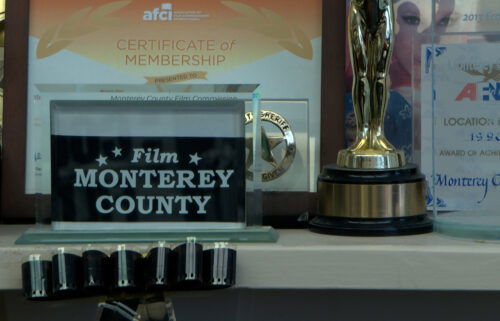Arizona AG takes aim at foreign-owned farms that pump groundwater to feed cattle overseas
By Ella Nilsen, CNN
Amid Arizona’s worsening groundwater crisis, the state’s new attorney general is vowing to crack down on foreign-owned farms that lease land from the state with the benefit of unlimited water pumping.
State officials recently revoked two new well-drilling permits for a Saudi Arabian agriculture company that uses Arizona groundwater to grow alfalfa to feed dairy cows overseas, and state Attorney General Kris Mayes told CNN she believes more action should be taken to curb the farm’s water pumping.
“I am never going to stop until these leases are canceled or not renewed,” Mayes said, adding that she will keep advocating for this within Arizona’s state government.
Arizona’s State Land Department leases thousands of acres to Fondomonte Arizona LLC, CNN has previously reported — a farming operation owned by Middle East dairy giant Almarai Company. It is one of several corporate farms in Arizona that have taken advantage of what residents and officials have said are lax groundwater laws that allow farms to pump unlimited water as long as they own or lease the property to drill wells into.
Fondomonte has received heightened attention as Arizona’s groundwater levels plummet. The company moved its alfalfa-growing operations out of Saudi Arabia — another water-scarce region suffering from longterm drought.
Mayes told CNN that one of two state leases the company holds is set to expire next year and said the state should not renew it.
“It would be unconscionable, I believe, for the state of Arizona to renew that lease with the Saudis,” Mayes said.
An attorney for Fondomonte did not return CNN’s request for comment. Last year, Fondomonte lawyer Jordan Rose stressed the farm has implemented irrigation systems to reduce its water use.
Arizona is suffering water scarcity on multiple fronts; its Colorado River water allocation could be severely pared back in future dry years, causing more reliance on groundwater. And state and federal analyses have found some groundwater basins are being severely overpumped.
Gov. Katie Hobbs, the state’s new Democratic governor, also vowed to take action to keep foreign farms from “profiting off” the state’s below-ground water.
“Governor Hobbs promised to take action to crack down on foreign governments profiting off Arizona groundwater and she did,” Hobbs’ spokesperson Christian Slater told CNN in a statement. “She will always fight to protect Arizona water for Arizonans and preserve our natural resources for generations to come.”
Revoking well permits
Mayes recently announced the Arizona Department of Water Resources had revoked the well-drilling permits sought by Fondomonte. State officials rescinded permits for two wells that had originally been approved in August, the department’s spokesperson Shauna Evans confirmed to CNN.
The wells would have been capable of pumping 3,000 gallons of groundwater per minute, according to Mayes. That’s far more than what’s used in homes; according to state estimates, 325,000 gallons is enough for three average-size homes in Phoenix for a year.
Fondomonte’s two new permits were revoked after Mayes highlighted inconsistencies in Fondomonte’s application with the state, which she detailed in a letter to the Arizona Department of Water Resources.
“We started looking at the actual applications and noticed a number of discrepancies in them,” Mayes told CNN, saying she met with ADWR head Tom Buschatzke after finding them. “It was clear from my meetings with ADWR that they were not aware of these discrepancies, and they were not aware if the wells had been drilled yet.”
While denying two well-drilling permits will likely not put much of a dent in Fondomonte’s existing farming operations, it speaks to a larger issue of a lack of groundwater regulation in Arizona’s rural regions, which allows landowners to pump unlimited water without having to report their usage to the state.
Mayes seized on Arizona’s water plight in her campaign last year and pledged to have Fondomonte’s leases canceled if she was elected, noting that she believed they violated the state constitution.
“It shouldn’t have happened in the first place,” Mayes said in September as she campaigned outside Fondomonte’s farm in rural Vicksburg, Arizona, last year. “We can get these leases canceled, and we should. We are essentially giving our water away for free to a Saudi corporation, and that has to come to an end.”
Arizona starts to tackle groundwater issues
While the actions the state attorney general announced last week don’t constitute outright canceling existing state leases Fondomonte holds, it’s a sign that a new administration is taking a closer look at the deal. The Arizona State Land Department leases more than 6,000 acres to Fondomonte, it told CNN last year, making it the second-largest agricultural lessor of Arizona land.
The state leases to Fondomonte caused an uproar last year after an Arizona Republic investigation found the company was paying the state a heavily discounted rate for the land, which did not take its water usage into account.
Last year, the state’s land department told CNN that it didn’t have the authority to implement additional groundwater regulations without action from the state’s legislature — which hasn’t passed groundwater reform since the 1980s.
In addition to leasing land, Fondomonte also owns about 10,000 acres of farmland in rural Arizona, CNN has previously reported. The company also owns about 3,500 acres in agriculture-heavy Southern California, where it uses Colorado River water to irrigate its crops.
Foreign-owned farmland is a growing trend in the US. In the water-scarce Western US, the practice increased from around 1.25 million acres in 2010 to nearly 3 million acres in 2020, according to data from the US Department of Agriculture. Meanwhile, in the Midwest, foreign-owned farmland has nearly quadrupled.
Mayes told CNN she expects further action on Fondomonte coming from the Hobbs administration.
“I think you’re going to see action by the governor’s office by the end of the year,” she said. “The vast majority of Arizonans believe that giving away our water for free to the Saudis so they can feed their cows is insane.”
The-CNN-Wire
™ & © 2023 Cable News Network, Inc., a Warner Bros. Discovery Company. All rights reserved.



